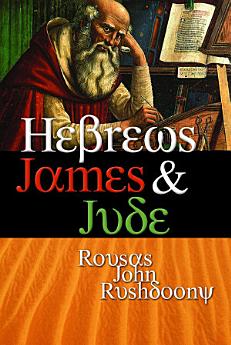Hebrews, James and Jude
About this ebook
When James, in his epistle, says that faith without works is dead, he tells us that faith is not a mere matter of words, but it is of necessity a matter of life. We are dead men if we no longer can breathe, and we are spiritually dead if our faith is unaccompanied by works. Too many churches are like graveyards because too many members have no living faith. "Pure religion and undefiled" requires Christian charity and action. Anything short of this is a self-delusion. James's letter is a corrective the church needs badly.
Jude similarly recalls us to Jesus Christ's apostolic commission, "Remember ye the words which have been spoken before by the apostles of our Lord Jesus Christ" (v. 17). Jude's letter is usually classified as an apocalyptic tract, but we cannot forget that all the Bible speaks of a division between fallen and redeemed humanity, between the saved and the lost, of the necessity for a new creation beginning with us, and of the inescapable triumph of the Kingdom of God.
About the author
Rev. R.J. Rushdoony (1916–2001), was a leading theologian, church/state expert, and author of numerous works on the application of Biblical law to society. He started the Chalcedon Foundation in 1965. His Institutes of Biblical Law (1973) began the contemporary theonomy movement which posits the validity of Biblical law as God’s standard of obedience for all. He therefore saw God’s law as the basis of the modern Christian response to the cultural decline, one he attributed to the church’s false view of God’s law being opposed to His grace. This broad Christian response he described as “Christian Reconstruction.” He is credited with igniting the modern Christian school and homeschooling movements in the mid to late 20th century. He also traveled extensively lecturing and serving as an expert witness in numerous court cases regarding religious liberty. Many ministry and educational efforts that continue today, took their philosophical and Biblical roots from his lectures and books.








